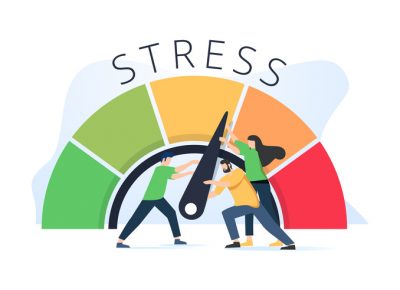Let’s look at the connection between stress and digestive health. There’s no doubt we’ve had added stress in our lives lately. Back to school and back to work in the era of Covid-19 could add stress to lives that would typically be calm and anxiety free. We know stress affects our ability to sleep and function properly, but did you know it affects your digestive health as well? Here are the ways stress can negatively impact your digestion and your overall health.
Stress Causes Heartburn
Heartburn affects most of our population. The biggest selling over-the-counter medications are digestive aids. The physiologic stress response can cause the sphincter that closes off the esophagus from the stomach to spasm. When this happens, stomach acid can make its way back up into the esophagus, causing it to burn your esophageal lining. Over time, this can leave you in a lot of pain and more prone to disease. Taking heartburn medication provides temporary relief as it decreases or stops the production of stomach acid all together. If you stop taking the medication, however, chances are the heartburn will return.
To address heartburn, you need to uncover the reason that you have it in the first place. Many people associate heartburn with poor diet, smoking and drinking alcohol. But anxiety and a fast-paced schedule can also be to blame.
If you constantly have heartburn, and you aren’t eating the common food triggers, you can evaluate if emotional stress is “eating you up” from the inside. If you are questioning whether your thoughts can affect your physicality, then think of something that makes you angry and notice how your heartbeat instantly rises. These negative emotions can create a constant low level of stress, which often presents as heartburn. Taking the time to notice these feelings, process them and let them go, can lead you back into emotional balance. This can have a profound effect on how you digest food.

Stress Affects Gut Immunity
Did you know that your digestive system is the largest immune organ in your body? Roughly 60-80% of your body’s immunity is housed in your gut. Your digestive system is large and can house pounds of bacteria. Some of it is good bacteria, and some of it is not so good.
Your good bacteria help you to fight off viruses, help you to digest your food and help to produce chemical reactions to help your brain and body function properly. This good bacteria is vital to your body’s immune function.
When you are in a stress response, the chemical reaction that is produced by the sympathetic nervous system wipes out a large proportion of your good gut bacteria. Over time, this can lead to a weakened immune system and overall inflammation of the body.
You can strengthen your immune system by taking a probiotic supplement; eating foods that naturally contain probiotics, such as kefir, kimchi and yogurt; and limiting foods with refined sugar.
Stress Can Cause Constipation or the Opposite
When you eat, your food should be in your digestive system for a certain length of time. This allows your gut to absorb the nutrients it needs, and, at the same time, allows it to get rid of any waste. When you are stressed, digestion can literally shut down. This can lead to constipation which interrupts the detoxification process that naturally happens during normal digestion. This can lead to a whole host of problems including gas, bloating, stomach pain and weight gain.
Stress can also have the opposite effect on your digestive tract. Stress might cause food to move too quickly through your system, not leaving enough time for the nutrients to be absorbed, which leads to nutritional deficiencies and other problems.
Stress Can Weaken Your Digestive Metabolism
Stress response can affect your digestive system by decreasing overall blood flow to the body. When you are stressed, your blood flow is redirected to the brain and to the limbs, as your body perceives you are under attack. Your blood gets directed to these parts of your body for quick thinking and fighting or fleeing. If your body is stressed and you are eating too fast, eating in a negative emotional state or eating too much, it can cause your metabolism to slow down.
Stress chemistry produces two hormones in your body – cortisol and insulin. The hormones that are released when you are stressed tell the body to store weight, store fat and not build muscle. To avoid this from happening in your body – you should slow down and breathe! Your body will best metabolize food when you are relaxed.
Manage Your Digestion for Better Health
Is your digestive system out of whack? Has unusual stressors or anxiety affected your digestive health? Our gastrointestinal health team has years of experience understanding digestive issues brought on by stress and anxiety. We can help diagnose your digestive health symptoms and develop an individualized treatment plan to get you on the road to a good health.
Contact us at 732-281-1590 or online HERE for a consultation.
